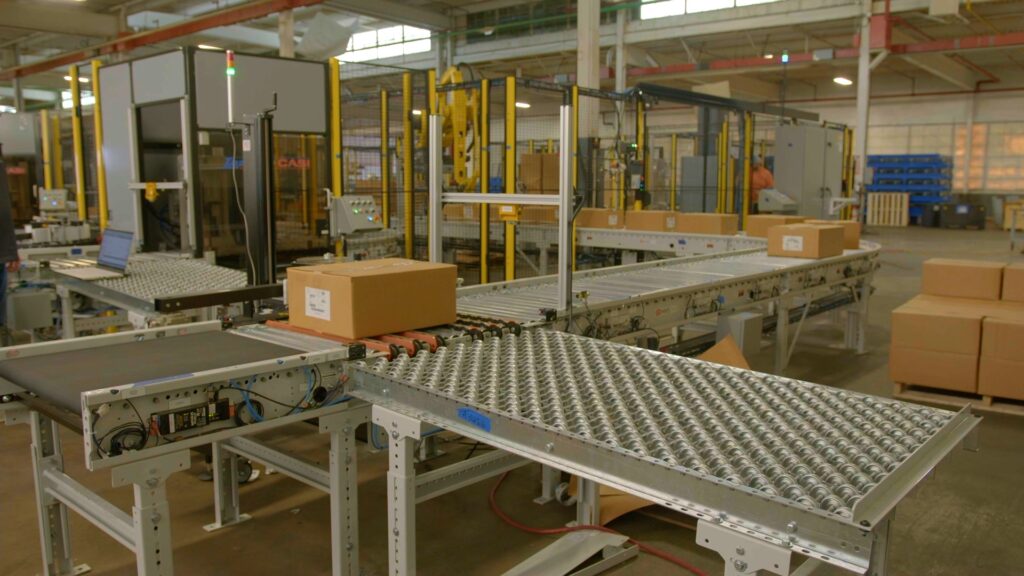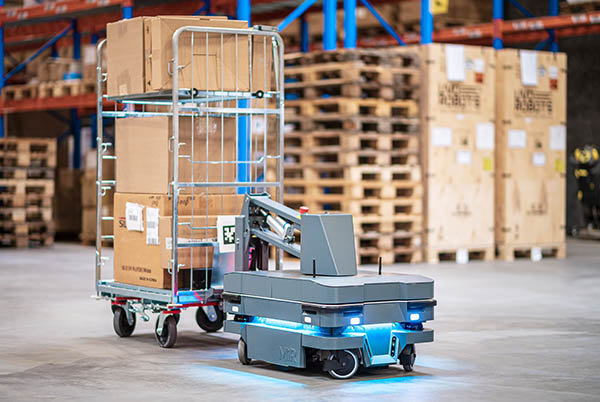In the dynamic landscape of manufacturing, companies are facing increasing demand for product variations to accommodate evolving consumer preferences and market needs.

Multi-SKU manufacturing, or the simultaneous production of different product variations within a single production line, has emerged as a strategic way for businesses to stay competitive and relevant in today’s market. While offering diverse stock-keeping units (SKUs) carries immense opportunity, it also introduces a range of complexities and challenges to business owners, particularly regarding automation.
Let’s look at the challenges multi-SKU manufacturers face with these product identifiers, and how flexible automation solutions can support them.
Challenges With Multi-SKU Manufacturing
Managing multiple stock-keeping units in manufacturing can be challenging despite the potential benefits. Issues such as inventory management, production line setup, and scheduling can present significant hurdles for companies looking to automate their multi-SKU manufacturing processes.
Inventory Management
Inventory management becomes more challenging with multiple SKUs for products. With more stock-keeping units, manufacturers need accurate and efficient strategies to handle and track products that have their own specific characteristics, quantities, and sales patterns. This complexity can lead to difficulties in accurately forecasting demand, maintaining optimal stock levels, and ensuring efficient storage and retrieval processes. Additionally, the need for accurate inventory tracking and control for multiple product details can pose logistical and organizational challenges, such as space allocation, picking accuracy, and inventory visibility.
Production Line Setup
Production line setup presents challenges due to the need for frequent changeovers and reconfigurations. In multi-SKU environments, the production line must be adaptable to accommodate different product code. This necessitates equipment, tooling, and workflow adjustments for each type of product. Continuous retooling and reconfiguration can lead to downtime, inefficiencies, and potential disruptions to the production schedule. Additionally, the complexity of managing multiple product details and quality requirements demands meticulous line setup and validation processes to ensure that each product SKU meets the required production standards.
Scheduling
Scheduling for multi-SKU manufacturers can be challenging due to the complexity of coordinating a diverse range of products on a single production line. Managing production schedules for multiple products with different specifications, production times, and sales trends requires careful planning and coordination to optimize efficiency and resource utilization.
 Changeovers between different SKUs can also impact scheduling, potentially leading to downtime and production inefficiencies. Furthermore, variations in demand for custom SKUs can complicate scheduling and forecasting processes, as production priorities and resource allocation must be continually adjusted to meet market demands and inventory levels.
Changeovers between different SKUs can also impact scheduling, potentially leading to downtime and production inefficiencies. Furthermore, variations in demand for custom SKUs can complicate scheduling and forecasting processes, as production priorities and resource allocation must be continually adjusted to meet market demands and inventory levels.
At RōBEX, we’re not just about providing cutting-edge technologies; we’re about crafting solutions that transform the way manufacturers handle multi-SKU production. Our expertise and advanced technologies are the keys to unlocking a smoother, more efficient manufacturing process. With RōBEX by your side, navigating the intricate maze of multi-SKU production becomes a seamless journey. It’s not just about overcoming challenges; it’s about setting new benchmarks for success in manufacturing.
Automation Technologies for Multi-SKU Manufacturing Solutions
Traditionally, automating multi-SKU manufacturing has been a cumbersome and costly endeavor due to the complexity of managing a variety of products on a single production line.
However, companies can successfully navigate this challenge with the right technology and approach. Implementing flexible automation solutions empowers manufacturers to seamlessly adapt their production processes and inventory tracking to custom SKUs without manual intervention. This can be achieved through various mechanisms, including flexible gaging systems, changeover End-Of-Arm Tooling (EOAT), Pick, Pack, and Palletizing (PPP) line principles, and non-contact systems.
Flexible Gaging Systems
Flexible gaging systems are crucial in multi-SKU manufacturing because they provide adaptable and customizable measurement solutions.
In multi-SKU environments, the dimensions and specifications of individual products can vary significantly. Flexible gaging systems are designed to accommodate these variations, allowing for quick changeovers and adjustments to ensure each product meets the required quality standards.
By incorporating flexible gaging systems, manufacturers can streamline their quality control processes, enhance product consistency, and maintain accuracy for all product variants.
Changeover EOAT
Changeover EOAT allows for quick and seamless transitions between different products on the production line. By using modular, customizable tooling options, changeover EOAT empowers manufacturers to achieve maximum flexibility and efficiency, significantly reducing changeover times, and minimizing production downtime when dealing with multiple SKUs for products.
Pick, Pack, Palletizing Solutions
PPP line principles are vital to efficiently handling a diverse array of products. This process involves the selection of items from inventory (pick), packaging them appropriately (pack), and arranging them on pallets for shipping or storage (palletizing). These principles allow for seamless handling of product variations within a single production line. By employing flexible automation solutions and adaptable EOAT, PPP line principles allow manufacturers to swiftly and accurately process different identification codes, optimizing productivity and fulfillment processes while maintaining precision and speed.
Non-Contact and Flexible Inspector Systems
 Flexible inspector and non-contact systems are crucial in ensuring the quality and consistency of multi-SKU manufacturing. These systems allow manufacturers to conduct inspections and quality control measures across a diverse range of products without the need for manual adjustments, further streamlining the production process.
Flexible inspector and non-contact systems are crucial in ensuring the quality and consistency of multi-SKU manufacturing. These systems allow manufacturers to conduct inspections and quality control measures across a diverse range of products without the need for manual adjustments, further streamlining the production process.
These technologies provide the agility and adaptability necessary to accommodate diverse product characteristics while ensuring efficiency and precision in the production process and inventory management systems.
Download Your Free eBook
By embracing flexible automation solutions and leveraging innovative technologies, multi-SKU manufacturers can overcome common challenges and ensure agility, efficiency, and a competitive advantage in today’s dynamic marketplace.
Discover how RōBEX can help you make informed decisions when implementing robotics automation for SKU manufacturing by downloading your copy of our free ebook. From our capabilities to the industries we serve, RōBEX is dedicated to delivering superior automation solutions.

 Changeovers between different SKUs can also impact scheduling, potentially leading to downtime and production inefficiencies. Furthermore, variations in demand for custom SKUs can complicate scheduling and
Changeovers between different SKUs can also impact scheduling, potentially leading to downtime and production inefficiencies. Furthermore, variations in demand for custom SKUs can complicate scheduling and  Flexible inspector and
Flexible inspector and